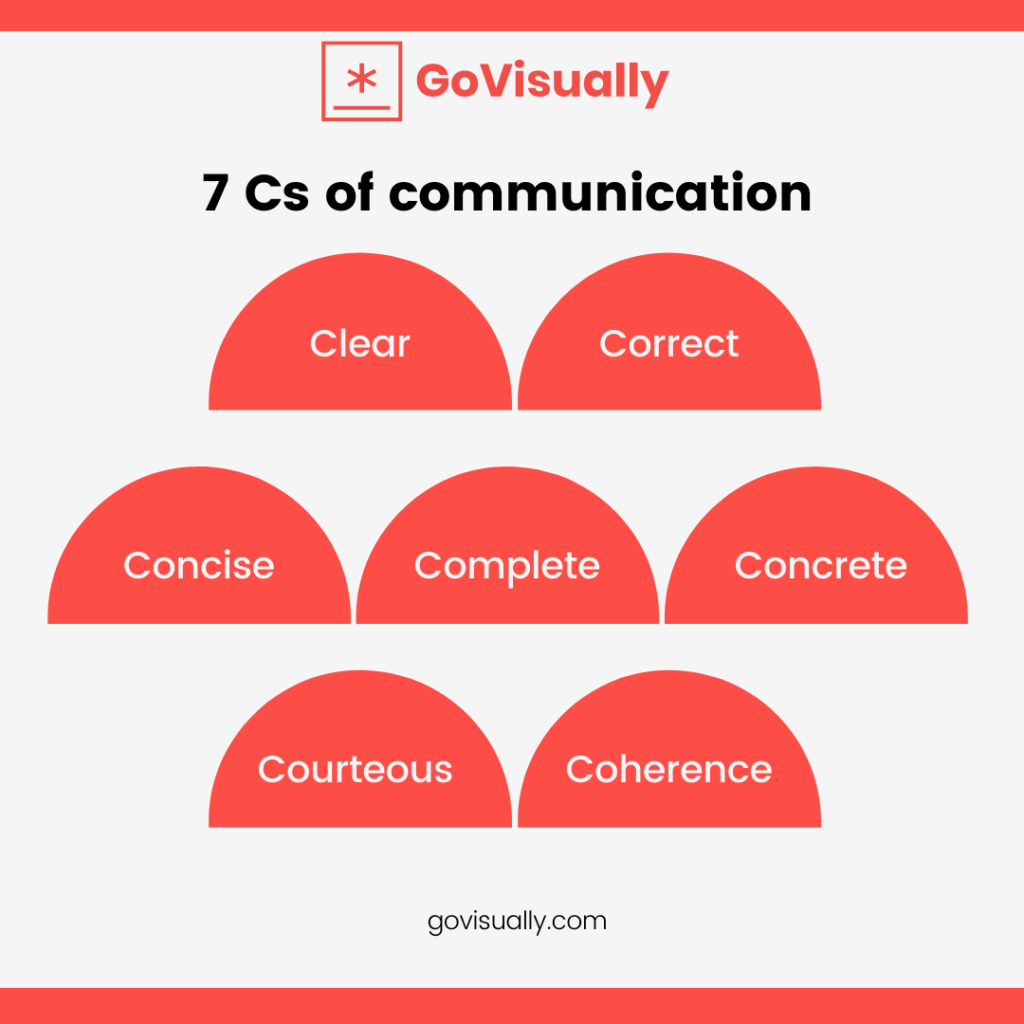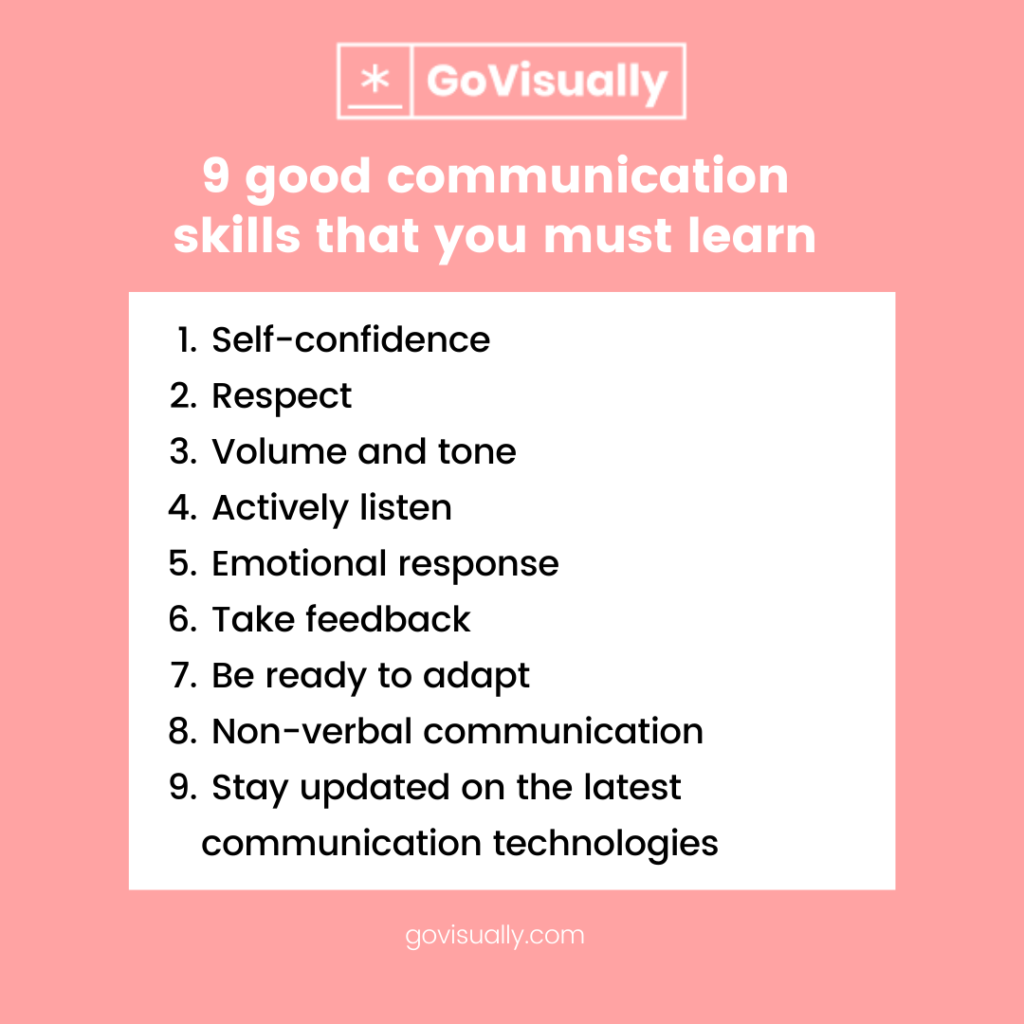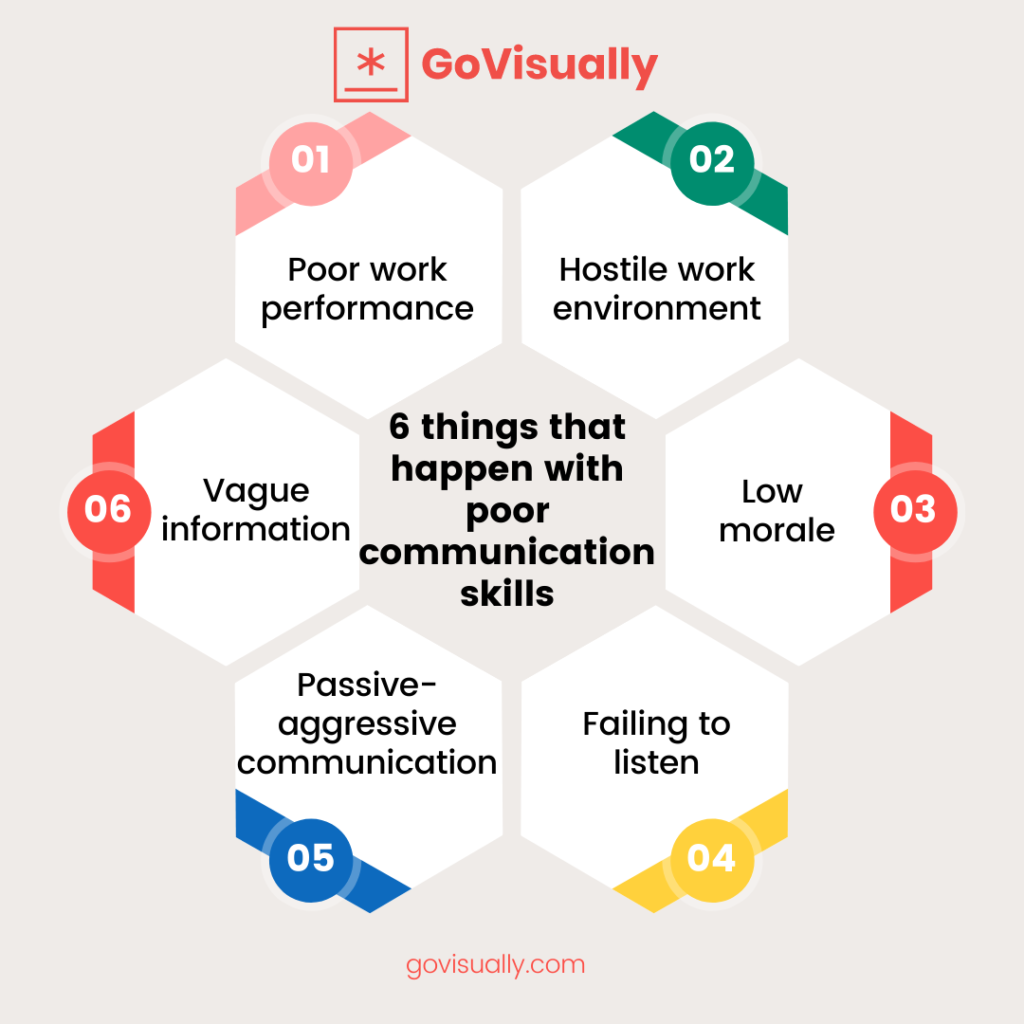“Why are good communication skills important?”
This is a question that many employees ask themselves. The answer to this question lies in the word communication. Good communication is not only a crucial life skill, but it is essential for career growth.
When you apply good communication skills to your workplace, you listen effectively, solve problems, and maintain employee well-being. Apart from these advantages, there are numerous other benefits of good communication.
If you want to implement this skill set, this article will discuss why are communication skills important in your personal life and the workplace and what good communication skills you must learn.
Let’s begin!
Cut design & video review time in half
Try GoVisually free today!
Table of Contents
Why are good communication skills important – an overview
Before we get into why are good communication skills important, it’s important to understand the term good communication.
Good communication happens when your message is sent and received accurately. Your message should be clear, and it should not create any confusion for the receiving party. This message could be verbal communication or written.
Why are communication skills so important?
If you are wondering why are communication skills so important? This is because good communication boosts teamwork and streamlines collaboration. Your effective communication skills can be applied to any industry, and you will always achieve career growth with this skill set.
Effective communication means that managers and team members are always on the same page, and there are no communication-related conflicts in the workplace. If you are working remotely, good communication is crucial for productivity.
If you keep the core values of good communication in mind, you will understand why are good communication skills important.
Why is developing good communication skills important?
Several benefits of good communication will help you answer the question: Why is developing good communication skills important?
One of the biggest advantages is that you will interact better with people. In the workplace, you have to interact with multiple people. Whether you work as a manager or a lower-level employee, your communication skills will help you succeed in your career.
If you are holding a meeting or participating in one, your communication skills will make your presence felt and communicate your ideas effectively.
If you are working on a project as a team, with good communication, you will collaborate better with your colleagues. You will strengthen your professional relationship, build trust, boost teamwork and become more productive.
For example, if you brainstorm ideas about marketing a product, it is important to learn good communication skills to have your opinions heard and understood. This skill will also help you articulate your ideas and take in any feedback effectively.
Communication is an essential part of your professional, and if it is not effective, even the best ideas will go to waste. These benefits highlight why are communication skills important in the workplace.
The 7 C’s of communication
Now that you know why are good communication skills important for your career, let’s look into building this skill set?
There are 7 core facets of good communication, called the 7 Cs of communication. Whether you are engaging in written or verbal communication, these seven facets will ensure that all your communication is effective.
When you focus on all 7 cs of communication, you are understood better and easily strengthen your workplace skills.
So, let’s get into them!

1. Clear
The most important thing to keep in mind is clear when communicating. Unclear messages are one of the biggest barriers to good communication. When you ask yourself why are communication skills so important?
You can avoid miscommunication by avoiding complex words. If you want to avoid miscommunication, your recipients should clearly understand your message, and they should know why you are interacting with them. Remember, the context of your message should be clear and easy to understand.
2. Correct
Sharing incorrect or vague information is one of the easiest ways for people to lose interest. Any information you are sharing should be grammatically and factually correct. If your communication is riddled with grammatical errors, people are less likely to understand you.
Sharing such a message will also leave a bad impression on people, and your credibility will get hurt. People won’t trust your information and will lose interest in anything you have to say. To avoid miscommunication, always fact-check your information and make sure it is correct.
3. Concise
Keep the length of your message as short as possible for good communication. A lengthy message with excessive words will ensure your message is hard to understand. Recipients will also take more time to consume a wordy message.
4. Complete
Make sure you are not sharing incomplete information and do not include all the important facts. Good communication means that your message has all the necessary points, making it more useful and credible.
Sharing complete messages is one of the good communication skills you must learn. Statements lacking information can affect the decision-making process and create misunderstanding.
5. Concrete
When your information is concrete, it is genuine and factual. A good way to make your message concrete is to use relevant words that fit the context of your message. When your information is concrete, it is easy to understand.
If your information is concrete, it gives your message and presentation confidence. People are more likely to be interested in your message if you exude this confidence.
6. Courteous
If you want to practice good communication, there must be an understanding between you and your receiver. When conveying your message, always be respectful of your audience and show appreciation.
Since receivers spend valuable time reading or listening to your message, you should always practice courtesy.
Connecting with your audience by letting them participate in the conversation is a sign of respect. You can also introduce humor depending on the situation.
7. Coherence
To make sure your message is perfectly understood, it should always be coherent. Coherence means that every part of your message connects to the other and makes sense.
If you want your message to be coherent, you need to structure it logically. Ensure that your message maintains consistency of language, tone, etc. Furthermore, you should create your message with your audience in mind so your information is effective.
Following these seven components is crucial for answering why good communication skills are important for your career.
9 Good Communication Skills that you Must Learn
Since we have answered the question, why are communication skills important in the workplace; here are some good communication skills that you must learn.
There’s nothing to worry about if you think you are not a good conversationalist, as it is incredibly easy to learn communication skills. The only thing that can stop you from being a good conversationalist is a lack of effort.
When you put in the effort to make your conversations better, you will foster good communication. Let’s look at some important skills you can master to become a good communicator.

1. Self-confidence
If you ask yourself what are good communication skills? Self-confidence comes out at the top. If you are confident while presenting your thoughts and ideas, you make a better impression on the people you are interacting with.
When you are confident, you are authoritative about your information, and the audience can easily trust you. There are several things to keep in mind if you want to show confidence.
These include:
- Maintaining eye contact
- Keeping a proper body posture
- Expressing gratitude
You can easily connect with your listeners and leave a good impression on these three attributes.
Self-confidence is one of the most important communication skills you must learn, but there is a fine line between confidence and over-confidence that you should never cross.
Always be mindful of your approach. When you are over-confident, your message comes across as aggressive and loud. You might risk making other people’s ideas feel inferior and prove your point forcefully.
2. Respect
Respect between you and your audience ensures good communication. A good way to show respect is to respect others’ ideas and let them speak openly about anything on their mind.
You should also watch your tone of voice while talking to people. Effective communicator always pays heed to their words before speaking.
Similarly, your nonverbal communication should be just as respectful.
In good communication, you shouldn’t be the only person speaking. Communication is a two-way process, which means if you want others to respect and listen to you, you should also extend the same courtesy to them and participate in active listening.
Remember, you should never force your thoughts as it will lead to failed communication.
3. Volume and tone
Good communication skills are one of the most important soft skills you need to learn for effective workplace communication.
And volume and tone make a very important elements of it. Your volume and style set the right atmosphere for your message; therefore, always keep these two attributes in mind for productive conversations.
Your tone significantly impacts how your audience perceives your message, especially in professional lives. However, your style can differ based on the situation. If you want to connect with your audience effectively, maintain a calm and consistent manner.
If you are dealing with clients, your tone should be warm and friendly. But if you want to delegate important tasks to your team members, your manner should be professional and authoritative.
The volume of your voice also plays a big role in how people perceive your message. If your voice volume is too low, people will have a hard time understanding you, but you will seem aggressive if your volume is too loud.
Keep your tone and voice balanced to ensure good communication.
4. Actively listen
There is a major difference between hearing and active listening. When hearing someone, you are only receiving the sound of the message. However, you hear and then process the sentences to understand their meaning if you actively listen.
Since good communication is about listening and learning, you need to listen to others to understand what they are saying actively. To become an active listener and for successful communication, you should ask questions to show your focus on the message.
5. Emotional response
Another important aspect of good communication is your emotional response.
Your emotional intelligence is an important form of communication in developing positive relationships in the workplace. When you share your emotions with other people, you relieve stress and maintain happiness.
You need time and effort to master this skill, but you’ll see positive changes in your communication methods once you get the hang of it.
6. Take Feedback
Feedback is daunting, but it is an important aspect of good communication. Good communicators always take their feedback positively as it shows the impact of their message.
With feedback, you can understand how an audience’s interacted with your message, and constructive feedback lets you know if there are improvements you need to make. During a conversation, ask your listeners to share their thoughts.
7. Be ready to adapt
There is no one way of communicating with people. You must choose different communication styles based on your audience. Before you converse with someone, assess the best communication style.
Apart from the style of communication, you also need to use different modes of communication. You can do audio calls, in-person meetings, and video conferences for lengthy and complex messages. If you want to share limited or quick information, you can send an instant message or an email.
8. Non-verbal communication
Communication is not just limited to spoken or written words. Good communication is heavily dependent upon non-verbal communication.
Your body language, facial expressions, and eye contact are all part of good non-verbal communication. These aspects make it easier for your audience to understand and retain your information.
9. Stay updated on the latest communication technologies
Online communication and collaboration tools are becoming incredibly popular in today’s workplace. In modern workplaces, you can see frequent use of chat and video conferencing software to help team members stay in touch.
Digital communication is rising in popularity, and it is crucial to stay updated on the latest technologies for good communication.
And that is why if you’re looking for good communication and an online review tool to manage your feedback time, use GoVisually.

It’s the one-stop-shop to collaborate online in real-time and approves creative digital assets within no time. You can invite your entire team to a project, have them provide feedback, and then download the approved asset directly. All of this saves you immense time on feedback collection through traditional methods. And more importantly, it helps you communicate effectively by bringing all stakeholders in one place.
Poor communication skills in the workplace
Still not sure why is developing good communication skills important?
Here are some problems you might face on a daily basis with poor communication in personal relationships as well as in your workplace:
- Passive-aggressive communication
- Failing to listen
- Poor work performance
- Low morale
- Vague information
- Hostile work environment

Final takeaway
This article should help you answer why developing good communication skills important?
Good communication leads to productivity that helps you achieve career growth. Good communication is crucial to building a positive relationship with your work peers.
Want to send big files?

Need a quick way to share large files and creative assets?
With GoVisually Share, it’s absolutely free! Try today.




